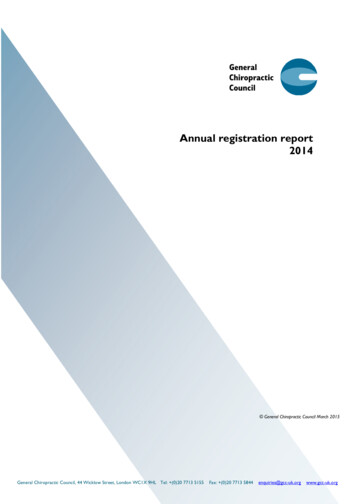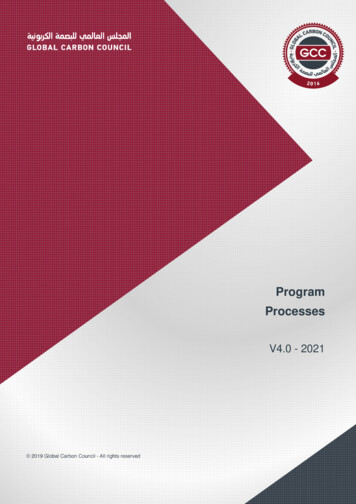
Transcription
GCC 2020 HR TechTrends Report
GCC 2020 HR Tech Trends ReportLast year Informa Connect and The Talent Enterprise research determined thattalent management and the use of technology were the “two most critical trendsto watch out for in 2018” in the GCC region. Based on that data we decided to divedeeper, to see just how many companies in the GCC were using HR tech, and forwhat purposes. We’re offering our exclusive findings here, in the first ever GCC 2020HR Tech Trends Report.Our survey results show that 2019 has indeed proven that HR Tech is movingfrom niche to mainstream in the GCC, with the majority of companies answeringpositively when asked questions about their interest in adopting HR Tech. The GCCstates are poised to digitally transform their HR organizations in 2020; right now is aturning point, with organizations curious and excited about trends such as artificialintelligence but in many cases not yet implementing those technologies. The timeis certainly ripe for companies that provide technology solutions to educate andinform.A Brief Overview of our Methodology“Our industry is evolving at a rapid rate. The traditional recruitment model has beentransformed into a new model where art and science combine to help establish deeprelationships in candidate communities through the power of digital technology, datascience and personalised communications at scale.”– Chris Greaves, Hays Gulf RegionOur GCC 2020 HR Tech Trends Report comprises the responses and insights of194 participants drawn from a wide range of industries and HR roles. Participantshave been drawn from companies located across GCC member states, the majoritybased in the UAE and Saudi Arabia. They represent human resources professionalsin diverse sectors, including: oil and gas, energy, healthcare, retail, hospitality &tourism, banking, manufacturing, food & beverage, software, logistics, educationand government institutions. This year’s survey consisted of 18 questions designedto discover how the GCC fits into the broad spectrum of emerging trends currentlyaffecting Global HR Tech. The conclusions drawn in this report are based on thecollected answers, clarifications, suggestions, proposed strategies and furtherinsights of our respondents.www.hrsummitexpo.com#HRSE02
1. HR Tech Strategy: 54% of SurveyRespondents Have One“The need for the most qualified candidates is greater than ever before, so naturally,HR professionals are turning to workforce analytics tools to make smarter, datadriven business decisions.”– Ghassan Talhouk, Head of LinkedIn UAE, LinkedIn Talent SolutionsHR Tech has definitely acquired a foothold in the GCC, but it still has a way to go. Our survey datashows that the majority of our 2020 survey participants have a formal HR Tech strategy in place –54.64% , while 45.36% of companies do not have a formal HR tech strategy in place. A good reasonfor this may be budget, HR tech can be expensive and 70% of our respondees have just 1-25% oftheir budget to acquire these systems. Another reason is simply that digital transformation hasbeen slow going for everyone, in every industry. A 2018 Gartner study tells us that “fewer than20 percent of employers in seven high-skilled economies are prepared to adopt digital workplacetechnologies”; HR professionals are certainly not immune to this skills gap that’s been broughtabout by the rapid pace of digitisation.Accenture data tells us that there is “ 3.1 trillion of future revenue growth” if companies cansuccessfully unlock employee data, so there is urgency for human resources departments to scaleup on knowledge, skills and the software to make that happen.When we broke down the numbers, we found that for respondents from Saudi Arabia, 62% had aformal HR Tech strategy, while the 56% of the GCC states minus Saudi Arabia (Kuwait, the UnitedArab Emirates, Qatar, Bahrain, and Oman) have one.The Entire Employee Lifecycle, Not Just Recruitmentis the Primary Need for HR TechSurvey respondents were asked for their key focus areas for technology improvement and wereable to give multiple responses. At 68.04%, Learning and Development topped the list with TalentManagement a close second at 67.53%. While Recruitment did factor strongly it came in thirdat 64.95%. People Analytics and Employee Engagement tied for fourth place at 47.42%, whileOnboarding was a close fifth at 42.27% and Employee Wellbeing at 28.87%. 12% of answers were“other” which included: payroll & benefits, occupational safety, and competency and performancemanagement.This was surprising, as the “shiny new toy” of HR Tech is often seen to be recruitment. HoweverTalent Management makes perfect sense, as the term is a catch all which includes recruiting,onboarding, developing and retaining. It’s also a sign that organizations are keen to have an all-inone solution, as opposed to using tech piecemeal for specific challenges.www.hrsummitexpo.com#HRSE03
Learning and Development and Talent Management being so popular is in line with the fact thatsaving money on employee retention is the real prize to be achieved from HR tech. Financially, hiringan employee costs a company around 4,000 to 16,000 per employee, while losing an employeehas the tidy sum of 6-9 months of their salary. To give an example, losing an employee who makes 60,000 would cost a company 30,000 to 40,000(I’m not sure if stats reflect the region). TheHays 2020 GCC Salary & Employment Report showed that 52% of GCC employees “expect to starta new job with a new company in 2020” with “the main reason to increase their salary”; with such acompetitive market employee retention is especially crucial.The GCC is wise to invest in HR tech not just for financial reasons, but in order to adapt to itschanging workforce. Hessa Al Ghurair explains: “the Middle East and North Africa (MENA) region’spopulation will increase by more than a quarter by 2030 and the majority of that population will beprime working-age as nearly half the existing population are under the age of 25.” The quote belowfurther emphasizes the importance of HR Tech to this up and coming demographic.“The (Middle East) is heavily invested in the digital age—particularly amongconsumers. In the United Arab Emirates, 70 to 80 percent of the population iscarrying a supercomputer in their pocket, placing the country in the top ranks ofglobal smartphone penetration. On this metric Bahrain, Qatar, and the United ArabEmirates score higher than the United States (100 percent vs 80 percent).”– Digital Middle East: Transforming the region into a leading digital economy Digital/McKinsey2. AI Is Considered to be the MostTrending Technology, but Fewer thanHalf of Organizations are Using It"I think it's clear most business executives now recognize the value AI brings totheir organisations, however when you take it down to a department level, HR isunfortunately still often overlooked. It is now up to the HR leaders to demonstratethe benefit of this incredible technology by focusing on the areas where impact willbe greatest. We've certainly seen an uptick in AI adoption over the last few yearsbut still only about 20% of HR departments globally are using AI-based solutionsaccording to a 2019 Gartner report. HR after all is about people, this is what wedo, and the fact that we are sitting on all this data and not using it to create newpersonalization strategies, improve data-based decision making and enhance theemployee experience at large, is a lost opportunity. In our new world where data isking, HR has never been more important or strategic than it is today."- Dena Almansoori, Founder & CEO, WhiteBox HRwww.hrsummitexpo.com#HRSE04
When asked “What is the most trending technology for human resources?” the respondees weregiven these choices: Artificial Intelligence, Machine Learning, Mobile Apps, Cloud & SaaS, WearableTech, Internet of Things, Learning Management Systems & e-Learning. Not surprisingly, AI toppedthe list at 34.02%, with Learning Management Systems & e-Learning at 28.87%, Mobile Apps13.92%, Cloud & SaaS 9.79%, IoT 6.19% and Machine Learning 5.15%. A big surprise was the lack ofinterest in wearables, just 1.55% of survey respondents listed that as a trend. Deloitte tells us that:“The global market for enterprise wearables—including smart watches, smart glasses, hearables,and exoskeletons—is expected to grow 41 percent annually to exceed US 60 billion in 2022” so it’snoteworthy to see an absence of interest here.AI in HR is an absolute game-changer. AI is a 'win:win' promising to driveperformance and efficiency for the organization and provide a more personalized,superior experience for candidates and colleagues. However, as a function, HR is alittle late to the party (when compared with other business functions).– Hannah Matta, Senior Director - Talent, Learning & Culture Diversity, Inclusion & Belonging,CareemWhile AI is seen at the most trending technology, just 41.75% of organizations in our survey areusing it. AI use in organizations still in many ways in its infancy; there are a great deal of challengeswhen it comes to implementing this technology. The Gartner 2019 Artificial Intelligence Surveytells us that “more than one-third of the HR leaders Gartner surveyed report the same three keychallenges when deploying AI: funding security and privacy concerns and the complexity ofintegrating AI into in-house infrastructures.”Companies surveyed in our study that are successfully using AI are predominantly applying it toLearning and Development efforts – 20.62%, along with Employee Self Service 17.53%; Recruitmentis a close third at 17.01%. Other uses for AI are Talent Management at 12.37%, and Chat Bots 8.76%.Once again we were somewhat surprised to find Learning and Development beat out Recruitment,www.hrsummitexpo.com#HRSE05
as AI for recruitment has been dominating the media lately. In a Korn Ferry survey of 777 GlobalTalent Acquisition Professionals, 69% said that AI helped them source higher quality candidates.Pieter Schalkwijk, Director Talent Acquisition International (EMEA, APAC, LATAM) for The Kraft HeinzCompany uses a synthetic intelligence tool called Pymetrics; interviewed in Fortune, he explainedAI’s immense value, specifically for diversity and inclusion. Maria Aspan writes: “before the use ofPymetrics, Kraft Heinz recruiters tended to scan résumés searching for top-tier universities. Now,Schalkwijk says, ‘it doesn’t matter if you’re from Cambridge’.” Lack of diversity at organizations hasbegun to hit company pocketbooks – for example Goldman Sachs recently announced they will nothelp companies go public that don’t have at least one woman Board member. We may somedaysee diversity be as much a need as employee retention, making AI all that more crucial. One thing tonote, however, is that AI is no magic bullet when it comes to diversity and inclusion. Hannah Matta,Senior Director - Talent, Learning & Culture Diversity, Inclusion & Belonging, Careem explains: “While AI promises more efficient, fair and objective people decisions, HR leaders must be cognizantof the potential to introduce or perpetuate bias in machine learning. Ethical AI implementationshould be central to every HR tech strategy.”Gartner just came out with their 2019 Artificial Intelligence Survey, finding that “Seventeen percentof organizations use AI-based solutions in their HR function and another 30% will do so 2022.”These numbers citing AI usage in HR are lower than other surveys we have come across, includingour own of GCC countries and Mercer’s Global Talent Trends 2019. In Mercer’s Global Talent Trends2019 report, their data found that: “Eighty-eight percent of companies globally already use AI insome way for HR, with 100 percent of Chinese firms and 83 percent of U.S. employers relying onsome form of the technology.” We’re not sure why the numbers are wildly different – Gartner’s 17%to Mercer’s 88%, but we’re glad our numbers are somewhere in the conservative middle.“AI is rapidly becoming a standard feature of almost all HR technology platforms.It’s still early days to make sure the AI works well, but all vendors are building thesecapabilities into their offerings.”– Josh Bersin, Global Industry AnalystWhen we isolated specific countries in the study, we found that for respondents from Saudi Arabia,58% were utilizing AI. In our GCC Compensation and Benefits Employer Trends 2019 Report, wewrote: “The fastest AI growth is predicted in the UAE, followed by Saudi Arabia. The UAE Strategy forArtificial Intelligence forecasts that Dubai will become a world leader in AI by 2031, generating up toUS 90 billion in extra growth.” 2019 the UAE launched a national strategy for artificial intelligence.Since our survey is based on 2019 data, we cannot expect to see the impact yet, but out of curiositywe isolated the UAE respondents, and their usage of AI was 35%. When we grouped all of the GCCstates minus Saudi Arabia (Kuwait, the United Arab Emirates, Qatar, Bahrain, and Oman) their AIusage was 45%.www.hrsummitexpo.com#HRSE06
3. People Analytics: 67% Use Them orPlan on Using Them in the FutureThe statistics coming out of case studies from organizations who use “People Analytics” areconvincing: a study by Ray Reagans, Ezra Zuckerman, and Bill McEvily estimated that if 30% ofproject teams at a major firm changed who they interacted with and shared information with “itwould save more than 2,200 labor hours in 17 days—the equivalent of completing nearly 200additional projects” while in another Credit Suisse saved 70,000,000 when they got predictions ofwho might quit. However like AI, data analytics is one of those activities that everyone wants butno one does. A Deloitte study tells us that “More than 70% of companies now say they considerpeople analytics to be a high priority” yet it also asserts that “only 9% of companies believe theyhave a good understanding of which talent dimensions drive performance in their organizations.”Tata Consultancy Services found “that just 5% of big-data investments go to HR”. Some of this isdue to the newness of IoT (the internet of things) and digital transformation. For example, Deloittetells us that 90% of Global companies “are exploring or designing the organization of the future” yetwhen it comes to implementing such new technologies as AI, HR is largely being left out - only 4%of HR organizations at companies are leading such efforts. Organizations with HR departments thatare successfully applying tech such as AI have a close relationship with IT. Gartner research verifiesthis: “41% (of organizations) highlight a close collaboration between IT and HR as one of the topthree reasons for their success.”HR and the Information Technology department is not the only disconnect; new Mercer researchshows that the majority of Executives - 73% - do not believe that investing in Employee Experience(EX) will bring a business return. For HR, EX is their highest priority. Mercer advises HR needs theC-Suite to get on board because: “companies with high EX ratings have twice the innovation andcustomer satisfaction compared to their lower-rated peers.”Of our survey respondees 20.62% say that they are using People Analytics, and 46.39% have plansto use them in the future. Just 30.41% of respondents say they are not using this sort of data at all.Breaking that down to compare GCC (minus Saudi Arabia) vs. Saudi Arabia it’s about the same –67% of GCC organizations are using People Analytics or plan on using them in the future, while 65%of Saudi Arabian organizations are doing the same.www.hrsummitexpo.com#HRSE07
4. HR Tech in GCC: Spending for 2020“I may be considered an optimist but I do believe we are witnessing the beginningof an exciting new way of working in the MENA region. Once monitored andused ethically, the advancements of M2M learning, the internet of things and AIhas the potential to remove monotonous tasks from our daily lives and routines.Whilst many may fear this leads to the removal of jobs, I see it as an opportunityfor reskilling and focusing on what matters; modernised leadership, employeeexperience and a stronger focus on the Humanities. Having worked in developingcountries, what separates this region is that all of the technology has the requiredinfrastructure and backbone to actually work. Investment in high speed fibre opticsand 5G are helping to bring this vision to reality for the UAE.”– Joseph Hayes, the Director of Learning & Development Planning at EtisalatIn our survey, 58.25% were planning on implementing some sort of technology for their HR functionover the next 12-18 months, while 10.31% do not have a plan to do so, and 31.44% said “maybe”.This is in line with around 54% of companies having a formal strategy. When we isolated some ofthe countries, numbers were similar. 92% of companies in Saudi Arabia were either definitely orpotentially going to implement HR Tech in the next 12-18 months, while 90% of the other five GCCcountries had similar plans.All of the survey respondents plan on investing money in their HR departments over the next year,with 9.28% planning on spending 100,000 or more, 5.15% 75,000- 100,000, 23.71% 25,000 to 75,000 and the overwhelming majority 61.86% just 1,000 to 25,000. The trend here – of thelargest group devoting the least amount of budget - is repeated when we asked what percentage oftheir HR budget was devoted to technology. 69.07% were in the 1-25% range, 21.03% were spending26-50% of their budget on tech. 6.7% are spending 51% to 75% and 3.09% are spending 76% or moreof their budget on tech.www.hrsummitexpo.com#HRSE08
When we pulled out the GCC countries and separated Saudi Arabia by itself, we saw that 8% ofSaudi companies were spending 75% or more of their HR budgets on tech, 13% spending 51%-75%,8% were spending 26-50%, and 71% were spending 1-25% of their budgets. For the GCC statesminus Saudi Arabia (Kuwait, the United Arab Emirates, Qatar, Bahrain, and Oman) we see just 1%spending 76-100% of budget, 8% spending 51-75%, 25% spending 26-50% of budget, and 66%spending 1-25% of budget,We dove a little deeper to ask respondents if their solution was in-house or not and what enterprisetech companies they were using for their human resources needs. 51.55% were using a cloud-basedHR solution, 11% an in country based cloud solution, 26.8% an on-premise solution. 24% seemed tobe using a combination of all, while 8.25% were using “other” which was mostly those who were notusing any tech.“I think there are two things that are becoming quite clear in HR Tech spacegenerally. One – the continued R&D into AI, Machine Learning and automationtechnology will only accelerate. The cloud and subscription based models will moveexisting and new clients to adapt and adopt these types of roadmaps almost bydefault. Everyone better get ready to create more digitally savvy HR organizationsthat can change ways of working quickly, not in years but in months. Two –From what I have seen in the region specifically, there is still a high emphasis onoperational and tactical HR work often executed with heavy manual input and a lotof people involved. Given the challenges in the world economy and the need for HRto modernize – I believe there will be an even stronger appetite for HR effectivenessand continued transformation. I think this trend has been accelerated by the SaaSgiants in HR and I think it will now go even faster via AI and Machine Learningcapabilities.”– Andreas Binnmyr, HR Transformation and Technology Leader, Al-FuttaimSAP, Oracle and Microsoft Dominate the Field in GCC23.20% of those surveyed said they were working with Microsoft for their HR technology, with SAP aclose second at 22.16% and Oracle third at 21.13%. IBM take up 3.09% of their business while SABAis used by 1.3% of survey respondents. Almost 30% use “other” which includes quite a diversity:VB.Net, Odoo, Workday, Payspace, Amanat HRMS, INNOWORK, MENA, Excel, Beneple, JobAdder,Totara Learning, People365, Exceed365, BambooHR, Menaitech, Filemaker, Area9, Excel, NextJuggernaut, AWS, ZenHR, Exactly, Mambo and Adrenalin. A handful were using in-house solutions,and a few are actively seeking a new solution. ( Better to run this by Ben to confirm if he wants thisin the report, we added this question more so for us to know companies that we can reach out to)Globally, HR Tech is currently a 148 Billion market. While SAP and Oracle are dominating the spaceright now in the GCC, don’t be surprised if GCC’s next big HR Tech solutions come from MENA;late last year Mubadala, Abu Dhabi’s state investor, announced “two new MENA tech funds thatwill invest 250 million in start-ups from the Middle East region”. Mudabala’s vision is for tech toincreasingly replace oil in the UAE states as their economies evolve; their very first investment innew Middle East-focused funds was Bayzat, a company that automates HR administration.Extra Sources:www.hrsummitexpo.com#HRSE09
HR Tech and COVID-19: What Will the Future Hold?Due to COVID-19, early this year an unprecedented disruption to “business as usual” hit the Globe.In the UAE for example, about 70% of the workforce were restricted to their homes to stem theoutbreak starting in March of this year. Working from home is not surprisingly one of the hottesttopics around this “new normal” of coronavirus, as businesses around the Globe have been forced toclose their offices. From recruitment, to keeping employees calm, engaged and productive, HumanResources have become more crucial to businesses than ever before. The Economist went so far tosay that: “In a pandemic, (a Corporate HR Chief), can make or break a company.”HR departments have been called upon to retain a sense of normalcy and connection. MichelleDavies, Vice-President of People at Phrasee explains: “Everyone’s been in panic mode, whetherit’s fears over losing their job or that they weren’t able to buy toilet paper. But it’s not just aboutcommunicating with people formally about business matters. In the office, people have lots ofinformal connection points, so we’ve tried to recreate that virtually as you have to try and keepthings as normal as you can.” Human Resources consultant and researcher Rada Hrout of Jordan,was quoted in EuroNews: “With COVID-19, we discovered the need for a more ‘human touch’ in allthat we are offering. This is what customers are asking for, it is what employees are craving, to keeptheir engagement levels [up], and to keep their productivity levels as high as possible.”Prasad Rajappan CEO and Founder, Zing, writes: “The HR function along with the businessesat large have found that HRtech is the best bet during these testing times to improve the teamcollaboration, productivity and keep achieving the business outcomes”. Indeed HR Tech has becomea critical tool in maintaining calm and continuity for workers during the COVID-19 pandemic, inmany cases work has become a lifeline to people who are isolated from their friends and families.Fun virtual activities such as pub quizzes, online fitness classes and after-work gatherings provideteam-building and help alleviate the multiple stresses that the current pandemic has brought topeople’s lives.Working from home for the most part has been a positive experience for many employees. A ForbesMiddle East study found that: “More than three quarters of respondents work as well or better athome, with 42% saying that they are just as productive working at home as they are in the office,and 34.3% saying that their productivity has increased while working from home.” Their studyconcluded that: “working from home is likely to continue, even after the health risks are reduced,as respondents feel that productivity is better at home than in the office.” Abdelrahman Shaath, anengineer in Abu Dhabi expressed his thoughts on working from home: (It has) “reduced my travelcosts to work and I don’t have to order food from outside At the same time, it has increased myproductivity level.” In Saudi Arabia, HR employee Nawaf M, whose team is working from homeas of this writing (June 1 2020 ) explained that he missed the office to Arab News: “I don’t likeworking from home. I feel like the office atmosphere is so important to maintaining a sense ofprofessionalism and producing results.” It is reported that US companies from Twitter to Nationwidehave made remote work permanent; it will be interesting to see if others will follow suit, and if thiswill set about a chain reaction globally.www.hrsummitexpo.com#HRSE10
e-east/https://www.mckinsey.com/ h-funds.htmlwww.hrsummitexpo.com#HRSE11
Conference & Exhibition: 16 - 18 November 2020Workshops: 14, 15 & 19 November 2020Multaqua Ballroom & Main Halls 5 & 6, DWTCDubai, UAEMIDDLE EAST’S LARGESTHR CONFERENCE AND EXHIBITIONThe #1 Place to meet HR Professionals in the Middle EastFind out more at https://informaconnect.com/hr-summit-expo/SThe HR Observer is the region’s first of its kind initiative aimed at becoming a platform for HRprofessionals to exchange insights freely both online and offline in efforts to help develop theprofession in the Middle East.Visit www.theHRobserver.com to know more.www.hrsummitexpo.com#HRSE12
Our survey results show that 2019 has indeed proven that HR Tech is moving from niche to mainstream in the GCC, with the majority of companies answering . Hays 2020 GCC Salary & Employment Report showed that 52% of GCC employees "expect to start a new job with a new company in 2020" with "the main reason to increase their salary .










